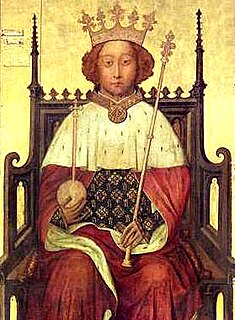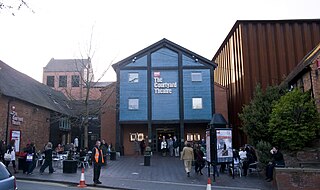This England: The Histories was a season of Shakespeare's history plays staged by the Royal Shakespeare Company in 2000-2001. The company staged both of Shakespeare's tetralogies of history plays so that audiences could see all eight plays over several days. The plays staged were: Richard II , Henry IV, Part 1 , Henry IV, Part 2 , Henry V , Henry VI, Part 1 , Henry VI, Part 2 , Henry VI, Part 3 , and Richard III .

William Shakespeare was an English poet, playwright and actor, widely regarded as the greatest writer in the English language and the world's greatest dramatist. He is often called England's national poet and the "Bard of Avon". His extant works, including collaborations, consist of approximately 39 plays, 154 sonnets, two long narrative poems, and a few other verses, some of uncertain authorship. His plays have been translated into every major living language and are performed more often than those of any other playwright.

The Royal Shakespeare Company (RSC) is a major British theatre company, based in Stratford-upon-Avon, Warwickshire, England. The company employs over 1,000 staff and produces around 20 productions a year. The RSC plays regularly in London, Newcastle upon Tyne and on tour across the UK and internationally.
A tetralogy is a compound work that is made up of four distinct works. The name comes from the Attic theater, in which a tetralogy was a group of three tragedies followed by a satyr play, all by one author, to be played in one sitting at the Dionysia as part of a competition.
Previously, the RSC had offered seasons in which one of the tetralogies had been staged at the RSC, such as The Wars of the Roses (the Henry VI plays adapted by John Barton), or The Plantagenets (the Henry VI plays directed by Adrian Noble). However, staging all eight plays in sequence was such a mammoth task that it had never been attempted. The RSC solved the problem by maintaining the same actors in the same role, but giving different plays to different directors. The directors often interpreted the plays and characters in very different ways; some productions were in medieval dress, others in modern dress, for example.

The Wars of the Roses was a 1963 theatrical adaptation of William Shakespeare's first historical tetralogy, which deals with the conflict between the House of Lancaster and the House of York over the throne of England, a conflict known as the Wars of the Roses. The plays were adapted by John Barton, and directed by Barton himself and Peter Hall at the Royal Shakespeare Theatre. The production starred David Warner as Henry VI, Peggy Ashcroft as Margaret of Anjou, Donald Sinden as the Duke of York, Paul Hardwick as the Duke of Gloucester, Janet Suzman as Joan la Pucelle, Brewster Mason as the Earl of Warwick, Roy Dotrice as Edward IV, Susan Engel as Queen Elizabeth and Ian Holm as Richard III.
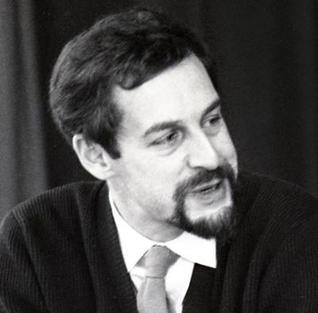
John Bernard Adie Barton, CBE was a British theatre director and a co-founder of the Royal Shakespeare Company.

The House of Plantagenet was a royal house which originated from the lands of Anjou in France. The name Plantagenet is used by modern historians to identify four distinct royal houses: the Angevins, who were also counts of Anjou; the main body of the Plantagenets following the loss of Anjou; and the Plantagenets' two cadet branches, the houses of Lancaster and York. The family held the English throne from 1154, with the accession of Henry II, until 1485, when Richard III died in battle.
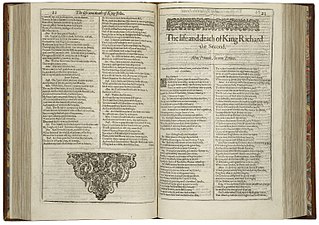
King Richard the Second is a history play by William Shakespeare believed to have been written in approximately 1595. It is based on the life of King Richard II of England and is the first part of a tetralogy, referred to by some scholars as the Henriad, followed by three plays concerning Richard's successors: Henry IV, Part 1; Henry IV, Part 2; and Henry V.
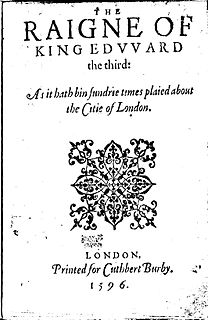
The Raigne of King Edward the Third, commonly shortened to Edward III, is an Elizabethan play printed anonymously in 1596. It has frequently been claimed that it was at least partly written by William Shakespeare, a view that Shakespeare scholars have increasingly endorsed. The rest of the play was probably written by someone else: Thomas Kyd, Christopher Marlowe, Michael Drayton, and George Peele among the top contenders, with recent scholars introducing Thomas Nashe to the fold.

Henry VI, Part 1, often referred to as 1 Henry VI, is a history play by William Shakespeare—possibly in collaboration with Christopher Marlowe and Thomas Nashe—believed to have been written in 1591. It is set during the lifetime of King Henry VI of England.
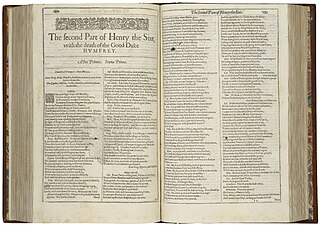
Henry VI, Part 2 is a history play by William Shakespeare believed to have been written in 1591 and set during the lifetime of King Henry VI of England. Whereas 1 Henry VI deals primarily with the loss of England's French territories and the political machinations leading up to the Wars of the Roses, and 3 Henry VI deals with the horrors of that conflict, 2 Henry VI focuses on the King's inability to quell the bickering of his nobles, the death of his trusted adviser Humphrey, Duke of Gloucester, the rise of the Duke of York and the inevitability of armed conflict. As such, the play culminates with the opening battle of the War, the First Battle of St Albans.

Henry VI, Part 3 is a history play by William Shakespeare believed to have been written in 1591 and set during the lifetime of King Henry VI of England. Whereas 1 Henry VI deals with the loss of England's French territories and the political machinations leading up to the Wars of the Roses and 2 Henry VI focuses on the King's inability to quell the bickering of his nobles, and the inevitability of armed conflict, 3 Henry VI deals primarily with the horrors of that conflict, with the once stable nation thrown into chaos and barbarism as families break down and moral codes are subverted in the pursuit of revenge and power.

The BBC Television Shakespeare is a series of British television adaptations of the plays of William Shakespeare, created by Cedric Messina and broadcast by BBC Television. Transmitted in the UK from 3 December 1978 to 27 April 1985, the series spanned seven seasons and thirty-seven episodes.

In the First Folio, the plays of William Shakespeare were grouped into three categories: comedies, histories, and tragedies. The histories—along with those of contemporary Renaissance playwrights—help define the genre of history plays. The Shakespearean histories are biographies of English kings of the previous four centuries and include the outliers King John, Edward III and Henry VIII as well as a continuous sequence of eight plays covering the Wars of the Roses. These last are considered to have been composed in two cycles. The so-called first tetralogy, apparently written in the early 1590s, deals with the later part of the struggle and includes Henry VI, parts one, two & three and Richard III. The second tetralogy, finished in 1599 and including Richard II, Henry IV, Part 1, Henry IV, Part 2 and Henry V, is frequently called the Henriad after its protagonist Prince Hal, the future Henry V.
Sir Antony Sher, KBE is a British actor of South African origin, a two-time Laurence Olivier Award winner and four-time nominee, who joined the Royal Shakespeare Company in 1982 and toured in many roles, as well as appearing on film and TV, and working as a writer and theatre director. In 2001, he starred in his cousin Ronald Harwood’s play Mahler's Conversion, and said that the story of a composer sacrificing his faith for his career echoed his own identity struggles.

Henriad is a term used by Shakespearean scholars and theatre productions to refer to a group, or a tetralogy, of William Shakespeare's history plays. In the original meaning, Henriad refers to: Richard II, Henry IV, Part 1 Henry IV, Part 2, and Henry V — with the implication that these four plays are Shakespeare’s epic, and that Prince Harry, who later becomes Henry V, is the epic hero.
Alan MacKenzie Howard, CBE was an English actor. He was a member of the Royal Shakespeare Company from 1966 to 1983, and played leading roles at the Royal National Theatre between 1992 and 2000.

Thousands of performances of William Shakespeare's plays have been staged since the end of the 16th century. While Shakespeare was alive, many of his greatest plays were performed by the Lord Chamberlain's Men and King's Men acting companies at the Globe and Blackfriars Theatres. Among the actors of these original performances were Richard Burbage, Richard Cowley, and William Kempe.
Simon Dormandy is an English theatre director, teacher and actor. As an actor, he worked with Cheek by Jowl and the Royal Shakespeare Company (RSC), as well as at The Donmar Warehouse, The Old Vic, Chichester Festival Theatre and The Royal Exchange, amongst many others. He is perhaps best known on screen for his performances in Little Dorrit (film) and Vanity Fair. Between 1997 and 2012 he taught drama at Eton College, Berkshire, and held the posts of Director of Drama and Head of Theatre Studies.
. He is currently working as a freelance theatre director. His directing credits include Julius Caesar at the Bristol Old Vic and Much Ado About Nothing at the Rose Theatre, Kingston, and his own adaptations of A Passage to India and the Coen Brothers' film The Hudsucker Proxy.
Gregory Doran is an English director known for his Shakespearean work. The Sunday Times called him 'one of the great Shakespearians of his generation'.
Maureen Beattie is an Irish-born, Scottish actress of both stage and screen.
Alex Waldmann is an English actor from London. He is married to director Amelia Sears.
The Hollow Crown is a series of British television film adaptations of William Shakespeare's history plays.
Henry VI, Part 2 is a 2016 British television film based on the plays Henry VI, Part 2 and Henry VI, Part 3 by William Shakespeare. It is the sixth film in the series of television adaptations of William Shakespeare's history plays produced by Sam Mendes for BBC Two under the title The Hollow Crown. It was directed by Dominic Cooke, who also adapted the screenplay with Ben Power. It starred Tom Sturridge as Henry VI, Sophie Okonedo as Queen Margaret and Benedict Cumberbatch as Richard. The adaptation presents Henry VI in two parts, incorporating all three Henry VI plays.
Richard III is a 2016 British television film based on the play of the same name by William Shakespeare. It is the seventh and final film in the series of television adaptations of William Shakespeare's history plays produced by Sam Mendes for BBC Two under the title The Hollow Crown. It was directed by Dominic Cooke, who also adapted the screenplay with Ben Power. It starred Benedict Cumberbatch as Richard III, Sophie Okonedo as Queen Margaret and Judi Dench as Cecily.






